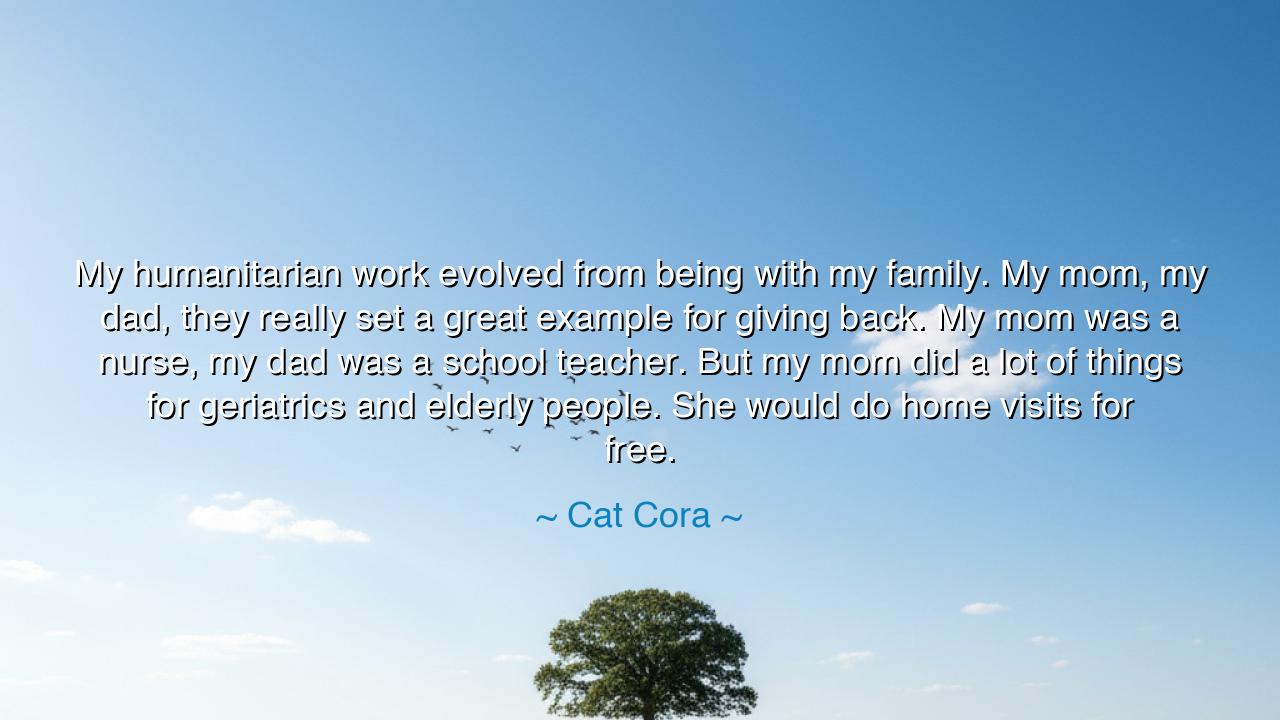
My humanitarian work evolved from being with my family. My mom
My humanitarian work evolved from being with my family. My mom, my dad, they really set a great example for giving back. My mom was a nurse, my dad was a school teacher. But my mom did a lot of things for geriatrics and elderly people. She would do home visits for free.






Cat Cora, chef and humanitarian, once spoke with a heart full of gratitude: “My humanitarian work evolved from being with my family. My mom, my dad, they really set a great example for giving back. My mom was a nurse, my dad was a school teacher. But my mom did a lot of things for geriatrics and elderly people. She would do home visits for free.” In these words lies a story not merely of charity, but of legacy. For she reveals that true service is not born of sudden inspiration, but of example lived daily in the home, where compassion is taught not through lectures, but through deeds.
The origin of this reflection is rooted in the household where Cora grew up. Her mother, a nurse, gave of herself not only within the confines of hospitals but also in the quiet corners of people’s homes, tending to the elderly without asking for payment. Her father, a school teacher, carried the noble calling of shaping minds, guiding children into knowledge and integrity. Together, they became living parables of generosity, embodying the truth that service is not a career or a performance, but a way of life. Cora, raised in this soil, found her own call to give back, not because she was told to, but because she had witnessed it.
History abounds with similar tales of greatness nurtured by the quiet examples of family. Consider Florence Nightingale, whose compassion was shaped in part by the influence of her parents, who valued learning and service. Her resolve to care for the wounded in the Crimean War was not a sudden act of charity, but the flowering of values cultivated at home. Or think of Mahatma Gandhi, who often spoke of his mother’s piety and discipline, saying that her example laid the foundation for his later life of sacrifice and service. In both lives, as in Cora’s, the torch of compassion was first lit by family.
The meaning of Cora’s words is deeply emotional and motivational. She reminds us that the truest inheritance we give to our children is not wealth or status, but the example of a life lived for others. A child who grows up seeing generosity, patience, and sacrifice will carry those same qualities into the world. Just as Cora’s mother, tending to the elderly in their weakness, unknowingly planted seeds in her daughter’s heart, so too our daily actions ripple through generations. What seems small today may echo in the lives of countless others tomorrow.
There is also a heroic dimension in this story, for giving without expectation of return is the highest form of courage. The world often tells us to guard, to hoard, to place our own needs above all else. Yet Cora’s parents showed a different path: that strength lies not in what we take, but in what we give. To teach children, to heal the sick, to serve the vulnerable without reward—this is the quiet heroism that sustains the fabric of society.
The lesson for us is clear: greatness begins in the home, and service is taught by example. If we wish to see a more compassionate world, we must first embody compassion in our daily lives. It is not enough to preach kindness; we must live it, so that those who watch us—our children, our neighbors, our friends—may learn not from our words, but from our actions.
Practically, this means seeking opportunities to serve where we are, without waiting for applause. Visit the elderly who have no one. Mentor a child who struggles. Use your skill, whether in teaching, healing, cooking, or building, to lift another person without expectation of reward. In doing so, you pass on a living example, just as Cora’s parents did, ensuring that the spirit of service does not die but multiplies across generations.
Thus, Cat Cora’s reflection is not merely the story of one family, but a testament to a universal truth: the deepest roots of humanitarian work are planted at home. Let us then live as examples of generosity, so that those who come after us may look back and say, “I, too, learned to give, because I saw it lived before me.” For in this way, the circle of compassion never ends, but widens until it embraces the world.






AAdministratorAdministrator
Welcome, honored guests. Please leave a comment, we will respond soon